
If you follow my writing – even casually – you know how excited I am about the direction of LMS innovation and its ability to help organizations create business value. Unlike those who think learning management systems (LMS) are largely irrelevant or are only for back-office operations, I see tremendous value and potential everywhere I look.
That’s because I’m focused on a much broader market opportunity for learning tech. The need for mandatory academic and employee compliance training is real, but organizations everywhere also are looking for better ways to educate their extended enterprise – customers, sales channel partners or member communities. That’s where modern learning technology is thriving and making a measurable difference. It’s also where LMS innovation is rampant.
We founded this blog to research the industry and provide fiercely independent reporting and analysis of learning technologies and strategies that make a business impact. Lately, I’ve been teaming up with other like-minded experts to deliver a series of free webinars on LMS innovation to help spread the word.
I’ve also been sharing my thoughts on other blogs around the world. One of those opportunities was with SpongeUK, where I explained how LMS innovation is helping businesses create new revenue streams. If you missed it, here’s a fresh look at that conversation…
1) Where do you see LMS innovation happening now?
From a geographic standpoint, a lot of innovation is coming from outside the United States. Learning management systems have been common in corporate America for well over a decade and most large organizations already have established LMS standards. As a result, the systems you see in the U.S. tend to look and feel very similar.
For the rest of the world – and for the UK in particular – our research shows that LMSs are not ubiquitous, so organizations have an opportunity to be more creative.
For example, if they need to develop sales competencies or speed-up the onboarding process, they can create a point solution by finding the most relevant content and platform for the need. So outside the U.S. there’s a lot of LMS innovation involving marketing capabilities, gamification, social learning and ways to enhance formal learning environments with informal learning activities.
2) You mentioned gamification, could you expand on what you think it means for the LMS industry?
After 20 years in the market, I could give you at least 20 examples of “hot” technologies that captured the spotlight for awhile. For example, mobile learning, TinCan (now xAPI), virtual classrooms and social learning were once considered cutting-edge but are all familiar now. I consider gamification the next in that series.
For content development, gamification is really coming on strong. It is a great tactic for getting people engaged with learning and I think there’s a lot of serious work being done in integrating game logic with content.
But LMS gamification is a bit different. It’s less about learning and more about process. Primarily it’s about functionality that awards points or rewards based on activities learning participants complete inside an LMS. These are not necessarily activities that increase knowledge, skill or competency, but just activities with arbitrary values that can accumulate over time. From a technical standpoint, it is fairly easy to add this kind of capability to a learning platform, so it’s not surprising that I’ve seen several dozen LMSs add at least some gamification elements in recent years.
Where the rubber really meets the road is in the strategic use of gamification in learning. What audiences are good targets and what business-related behavior are you trying to change or improve? If you can’t answer questions like that then it’s just window dressing and doesn’t have a meaningful impact. It’s still early, but perhaps one of the most interesting opportunities is coming from the association space, where gamification and digital badges are being used to help bridge the skills gap.
3) You speak often about the “true cloud” LMS. How do you define that?
“Cloud” means different things to different people. In my opinion, “true cloud” means an LMS is a multi-tenant platform with a core code base and every one of their customers uses that version of the LMS simultaneously. Each customer has its own secure location, completely separate from others, in terms of database, awareness and security, but they all share the same central code.
This contrasts with what many vendors call a cloud LMS. They’re really talking about “hosting” – where they install a version of their software on a customer’s server. Each installation needs to be enhanced, upgraded and managed individually, over time. It is very similar to how you would host software behind your own firewall, but it’s located in someone else’s hosted data center. This is very different from a “true cloud” multi-tenant system.
For vendors, the advantage of a true cloud model is that it’s easier to maintain, easier to support clients and all enhancements are built on a common piece of code that works for everybody. From an LMS customer’s standpoint, it’s relatively easy to get started, it’s less expensive and you don’t need your own IT department to maintain it.
For a few thousand pounds (even free in some cases), all you need to do is turn it on and the software is already there for you. You don’t have to worry about updating or upgrading a cloud LMS and all new advancements are automatically available. True cloud is where all the growth is happening and it’s definitely the way of the future.
4) What’s your best advice for organizations looking to invest in an LMS?
If I were selecting an LMS, the very first thing I’d want is the ability to drive revenue streams, rather than just manage training costs. I wouldn’t want to go beg for money to buy an LMS. I would want to create a case for how my learning programs can impact the business — whether that’s to help employees close more sales or generate higher profits, or to help channel partners sell better or faster, or to onboard customers more effectively so they have a successful experience with our product or service.
I would find a relevant metric I can tie to the business, so we know why we are buying this LMS in the first place. What we are trying to change, so we can create benchmarks now and measure the impact of LMS-supported learning over time?
It’s too easy for LMS buyers to get enamored with the latest buzzwords and one-off features like gamification and social learning. It helps to start with a pre-defined set of LMS requirements based on a clear set of use cases, so you can actually map out what you need before you start your search. This lets you focus on finding an LMS partner that specializes in what you want to achieve and a platform designed for the metrics that matter to you.
5) What do you see on the horizon in terms of LMS development?
I think true cloud has opened up a whole realm of possibilities that didn’t exist before. Traditionally, LMSs were only for large organizations wanting to manage training to save money through automation. Only huge institutions could afford it because LMS installation alone cost $50,000-$150,000 – far beyond the reach of smaller companies.
With the shift to cloud computing, there is no longer this implementation barrier to entry. So now an LMS is within anyone’s reach – even an individual entrepreneur. I use an LMS to provide measurable access to our webinar catalog. So suddenly, we all have the power to create learning content, to distribute it digitally on-demand, and sell it easily to virtually anyone in the world.
The lines are blurring between elearning and ecommerce. A lot of effort is going into the role that marketing automation, branding and content marketing, SEO and customer relationship management play in extended enterprise learning experiences. Elearning has always been somewhere outside that domain, but I think the real innovation is bringing them closer together so that learning technologies become part of the strategic portfolio of tools organizations use for competitive differentiation and business momentum. We’re entering a whole new era where learning can impact business results, rather than being seen as an internally-oriented cost center — and the possibilities for learning are limitless.
Exciting times ahead!
WANT TO LEARN MORE? REPLAY THIS WEBINAR:
LMS Selection Step-by-Step
With hundreds of learning systems available today, finding the right LMS for your unique extended enterprise needs can be tricky. But with so much at stake for, it’s worth the extra effort.
What exactly should you do to choose the best solution?
Walk step-by-step through a real-world example with John Leh, CEO and Lead Analyst at Talented Learning. You’ll learn:
- How to develop a relevant business case and success metrics
- Methods for researching and defining use cases and requirements
- When to issue an RFP (or not)
- Tips for creating a viable LMS shortlist
- How to make the most of vendor demos and proof-of-concept projects
Need Proven LMS Selection Guidance?
Looking for a learning platform that truly fits your organization’s needs? We’re here to help! Submit the form below to schedule a free preliminary consultation at your convenience.
[gravityform id=”18″ title=”false” description=”false”]Share This Post
Related Posts
The Future of Customer Education: Customer Ed Nugget 16
Customer education is rapidly evolving as organizations embrace new strategies and tech. What does this mean for the future of customer education? See what experts say on this Customer Ed Nuggets episode
Education Strategy Mistakes to Avoid: Customer Ed Nugget 15
What does it take to deliver a successful customer education program? It starts with a solid education strategy. Learn how to avoid common pitfalls on this Customer Ed Nuggets episode
Which LMS is Best for You? New Shortlisting Tool for 2024
How can you find the best learning system for your business? Our LMS shortlisting tool can help. Learn about the 2024 RightFit Solution Grid. Free, reliable guidance based on our independent research
How to Build a Learning-Based Business: Executive Q&A Notes
Building and selling online courses may seem easy, but building a profitable learning-based business is far more complex. Find out what successful leaders say about running this kind of business
The Rewards of Community Building: Customer Ed Nugget 14
What role does community play in your customer relationships? Find out why community building is such a powerful force in customer education on this Customer Ed Nuggets episode
Benefits of Training Content Syndication: Customer Ed Nugget 13
If you educate customers online, why should you consider content syndication? Discover 10 compelling business benefits in this Customer Ed Nuggets episode
Top Marketing Skills to Master: Customer Ed Nugget 12
Successful customer education programs depend on professionals with expertise in multiple disciplines. Which marketing skills lead to the best results?
How to Measure and Improve Partner Training ROI
An educated channel is a successful channel. But how do you know if your educational programs are effective? Learn from an expert how to evaluate partner training ROI
Mistakes in Ongoing Customer Training: Customer Ed Nugget 11
Customer education doesn't stop with onboarding. It pays to invest in ongoing customer training. Learn which mistakes to avoid in this Customer Ed Nuggets episode

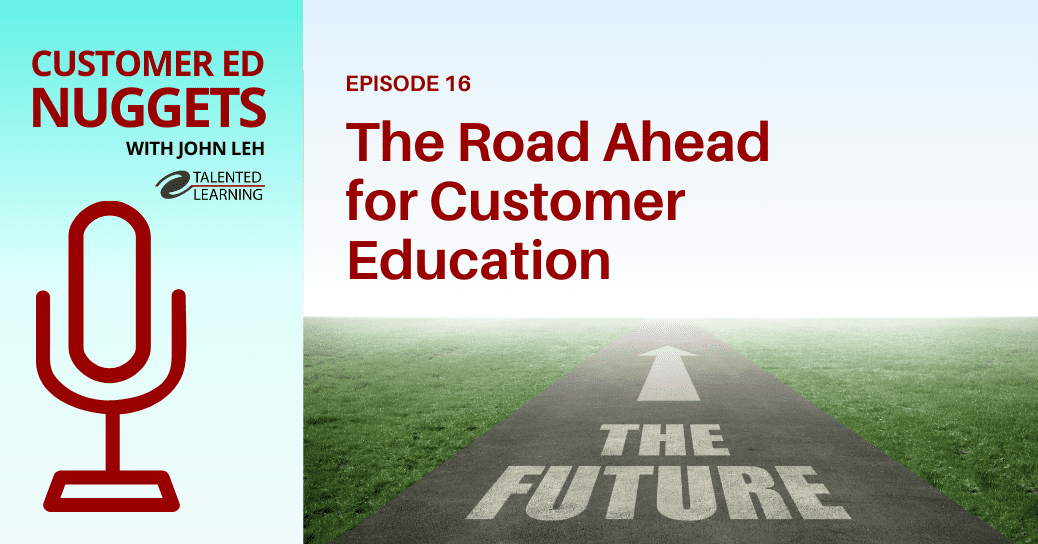

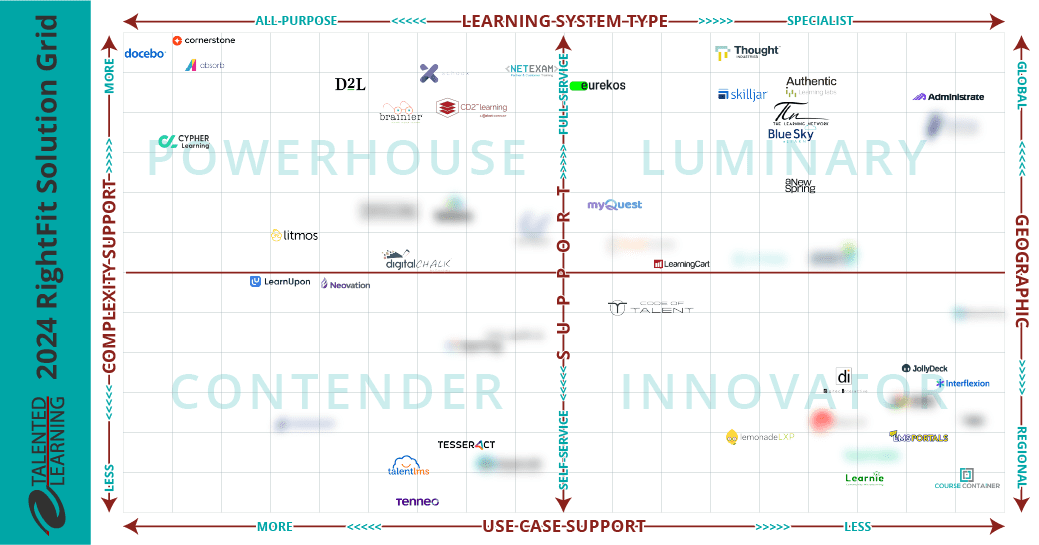


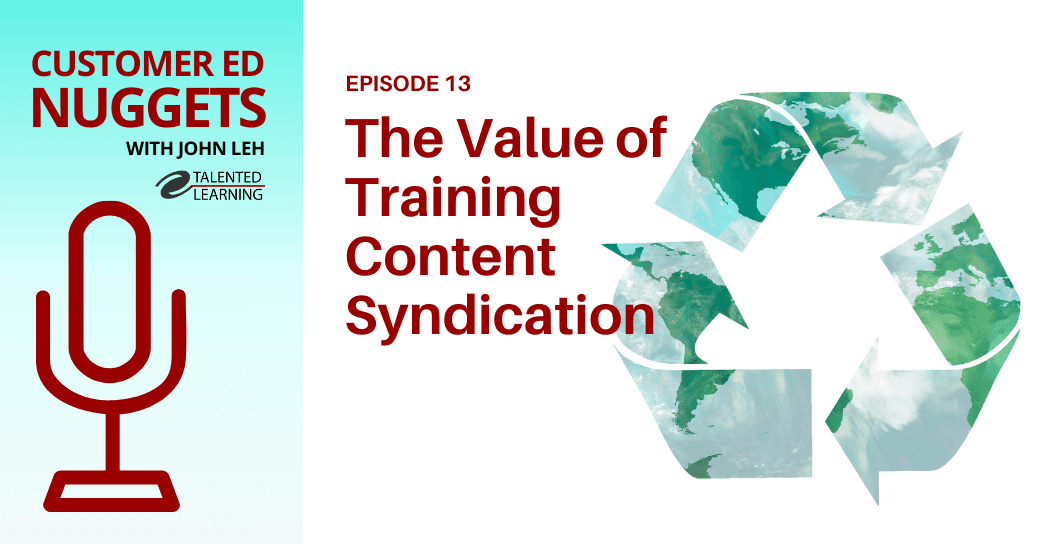


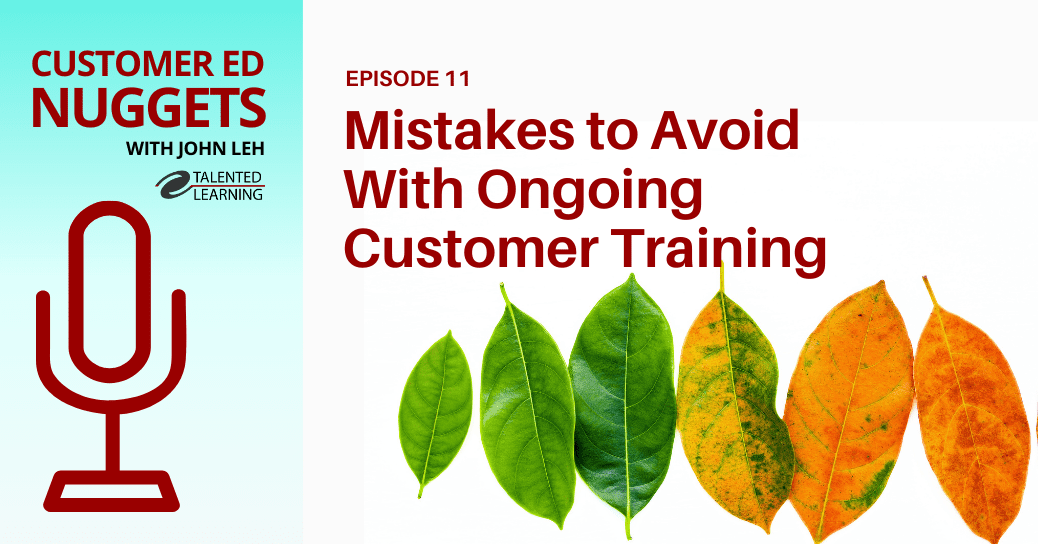

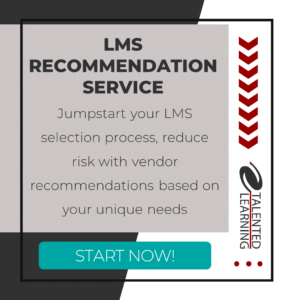
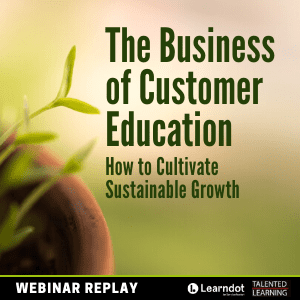

FOLLOW US ON SOCIAL